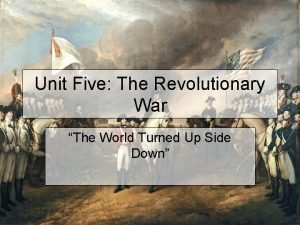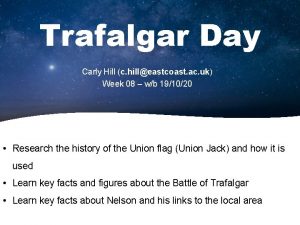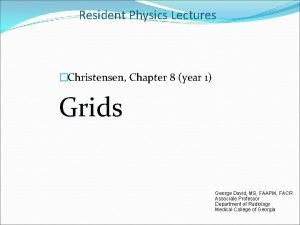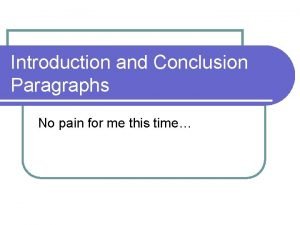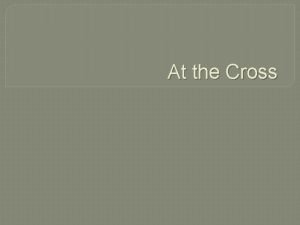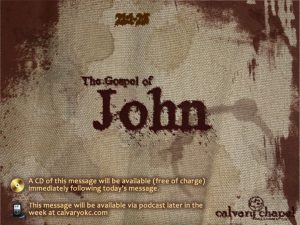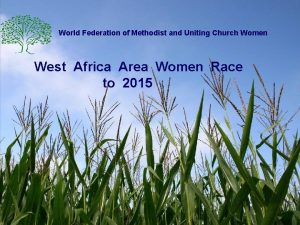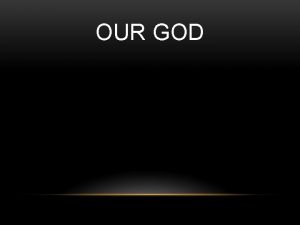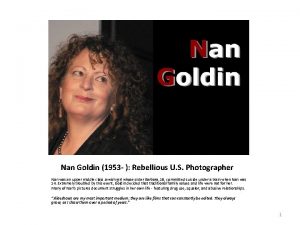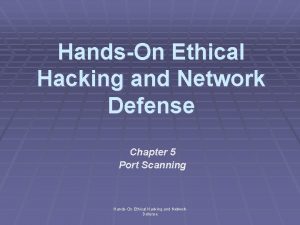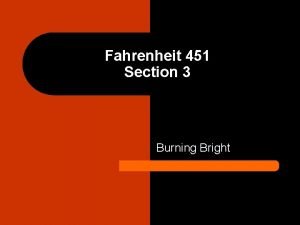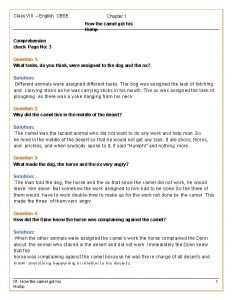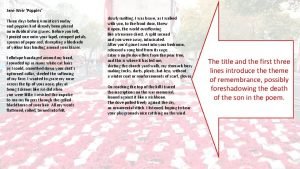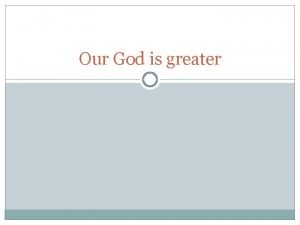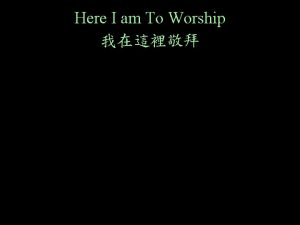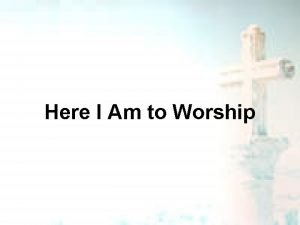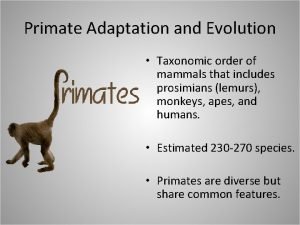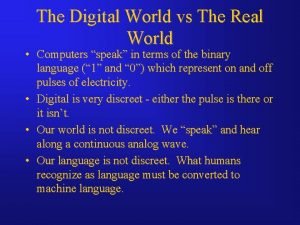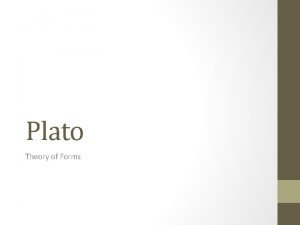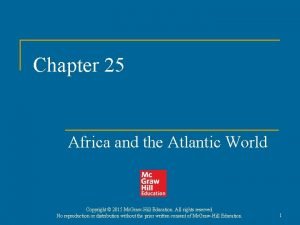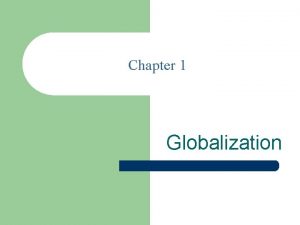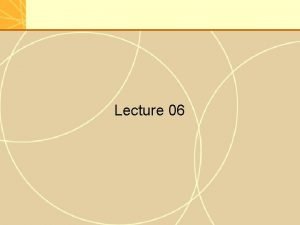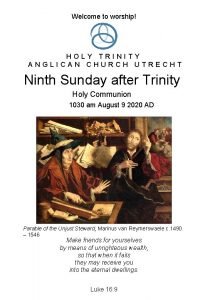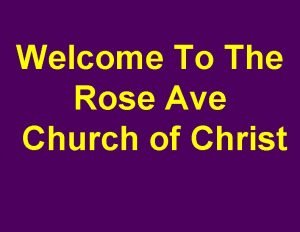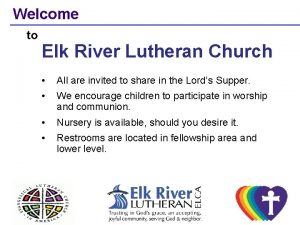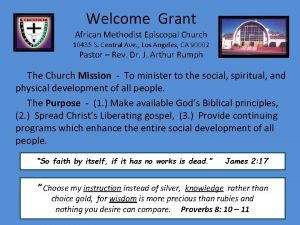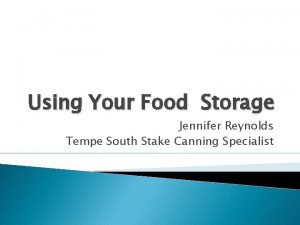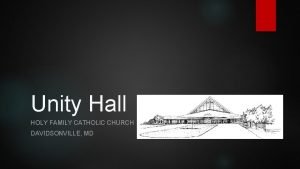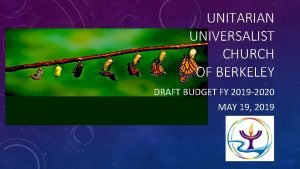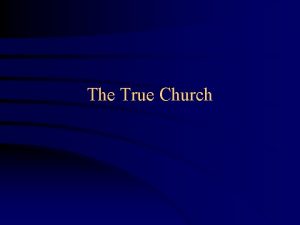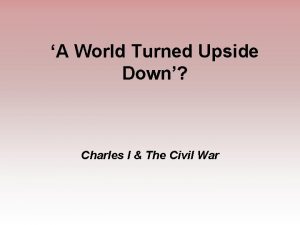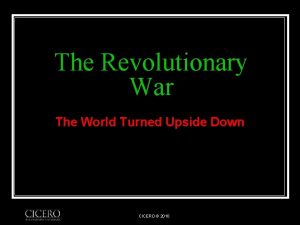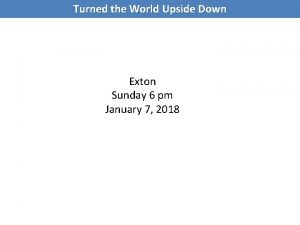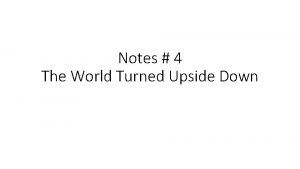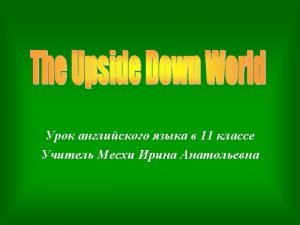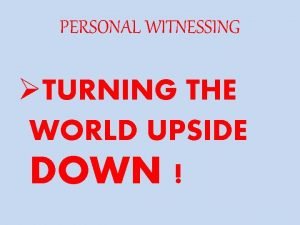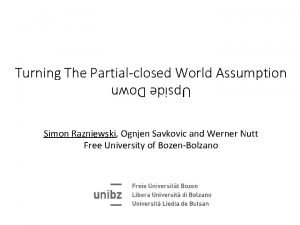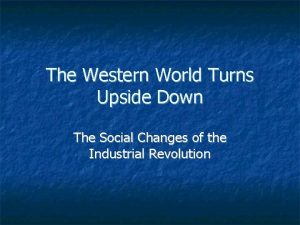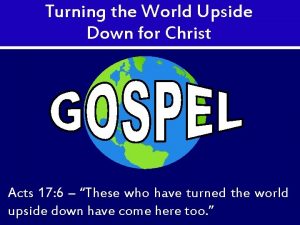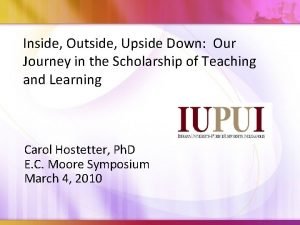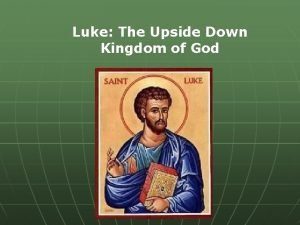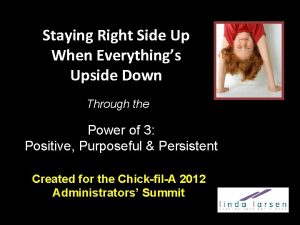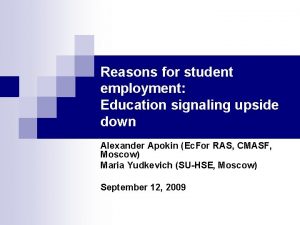How the Church Turned the World Upside Down











































































































- Slides: 107

How the Church Turned the World Upside Down.

Acts 17: 6. “These who have turned the world upside down have come here too. ”

Why Did They Say Christians Were Turning The World Upside Down? . “These are all acting contrary to the decrees of Caesar, saying there is another king—Jesus. ”

So Jesus, the King, and His Kingdom were at the center of why Christians were ‘turning the world upside down’.

A Different Kind of Kingdom.

My kingdom is not of this world. If My kingdom were of this world, My servants would fight, so that I should not be delivered to the Jews. - Jesus (John 18: 36).

How Could People Become Citizens of This Kingdom? .

“The kingdom of God shall be taken from you, and given to a nation bringing forth the fruits of it. ” Matt. 21: 43.

This was not just a new kingdom. It was a new type of kingdom. It was a type of kingdom that was totally different from what anyone– Jew or Gentile–had ever heard of before. .

The test of possessing this Kingdom was to bring forth the fruits of it. .

This kingdom was not limited to any particular nation or people group.

Anybody could choose to be a citizen of the kingdom of God.

Christ excluded nobody from His Kingdom–but those who excluded themselves. .

“The kingdom of God is founded in all who bear the image of the Man from Heaven. ”. ORIGEN

But producing the fruits of the Kingdom required more than studying Jesus’ teaching and deciding to obey them. .

It required: • New birth • Christ dwelling in a person.

No Earthly Boundaries to His Kingdom.

“The Christ of God shows His superiority to all rulers by entering into their various provinces and summoning men out of them to be subject to Himself. ” Origen.

“We acknowledge one all-embracing commonwealth —the world. ” Tertullian.

No Divided Loyalties Permitted.

In this new Kingdom, there could be no divided loyalties. Jesus can not be relegated to a subservient role by anyone or anything. He required all or nothing. .

“He who loves father or mother more than Me is not worthy of Me. ” Matt. 12: 30.

The Result: Conflict and PERSECUTION.


From A. D. 100 to 313 (Edict of Milan), Christianity was an illegal religion.

Every Christian lived with a death sentence hanging over his head!.

However, instead of stopping Christianity, persecution only caused it to grow and become internally stronger.

“The more often we are cut down by you, the more in number we grow. The blood of Christians is seed. ” Tertullian.

Persecution also produced a crop of Christian apologists who explained Christianity to the pagans.

The best-known apologists: • Justin Martyr • Tertullian • Origen.

A Kingdom with Upside-Down Values.

Christians rejected wealth, power, fame, and class distinctions.

“I do not wish to be a king. I am not anxious to be rich. . . I am not impelled by an insatiable love of gain to go to sea. I do not contend for laurels. I am free from a mad thirst for fame. . If I am a slave, I endure servitude. If I am free, I do not boast about my good birth. ” Tatian.

Three Christian practices that were revolutionary: . • The agapé (love feast) • Washing each others’ feet • Treating slaves as

“The first shall be last and the last shall be first. ” Jesus.

The more power, wealth, fame, & education a person had, the less likely he was to become a Christian. .

Most new converts came from: • Poor • Slaves • Less educated • “Lower” classes.

Most likely, more women than men.

Other Upside. Down Kingdom Values.

• Loving their enemies. • Rejecting war, torture and capital punishment • Turning the other cheek • Not suing others

Christians also rejected the world’s entertainment.


1 John 3: 13 Do not marvel, my brethren, if the world hates you. .

Tacitus called Christians “enemies of the human race”.

In addition to contending with persecution, Christians also had to combat the destructive heresy of GNOSTICISM.

1 John 4: 2 -3 “By this you know the Spirit of God: Every spirit that confesses that Jesus Christ has come in the flesh is of God, and every spirit that does not confess that Jesus Christ has come in the flesh is not of God. And this is the spirit of the Antichrist, which you have heard was coming, and is now already in the world. ”.

Tenets of Gnosticism: • The material world was created by a different god • The God of the Old Testament is different from the God of the New • The flesh is inherently debased and evil • Jesus did not come in actual flesh.

. End

How the World Turned the Church Upside Down.

Christianity had continued to spread. By A. D. 300, perhaps 10% of the Roman Empire was Christian. .

. A. D. 303 -311 The Persecution of Diocletian


This was the most widespread persecution ever—affecting Christians everywhere in the Empire. .

In the end, Diocletian couldn’t defeat the Christians. He resigned as emperor. .

In 311, the reigning Caesar issued the Edict of Toleration, officially ending the persecution. .

. Christ Had Won!!

In 313, the new emperor, Constantine, issued the Edict of Milan.


• Put Christianity on equal footing with all other religions • Required the immediate restoration of all church property confiscated. .

This appeared to be an incredible.

Next, Christianity became the favored religion of the emperor The State paid for sumptuous church buildings to be constructed.

It seemed undeniable that Christ was changing everything for the.

Perhaps the return of Christ was at hand.

Rome had always paid the salaries of the public priests, making them officers of the state. Constantine now began paying salaries to church leaders—making them officers of the state. Church leaders were also exempt from taxation. .

. You would think that the church leaders would have said “No” to this.

. But it seemed to everyone that the rules had now changed.

. The Battle Was Over!!

. Christ was victorious!!! The Kingdom of God had defeated the Kingdom of Satan!

The Donatist Controversy This should have alerted everyone to the danger at hand. If the state was going to pay salaries to the official church leaders in every city, it meant the state would have to determine who those leaders were. .

• Many of the Christians in Carthage believed that Caecilian, the bishop at the time the persecution began, had compromised with the persecutors. Therefore, they appointed a rival bishop. . • So when the persecution ended, in Carthage there were, two rival bishops, two sets of elders, and two bodies of believers. And each claimed to be the legitimate church of Carthage.

The Roman government paid salaries to Caecilian and his set of leaders. The rival church, now led by a bishop named Donatus, petitioned Constantine to rectify the matter. .

Council of Arles – 314. Constantine asked for a council of bishops to decide the issue. They decided for Caecilian, and the Donatists started a church schism.

. Arian Controversy

A person can’t understand the Arian controversy without grasping what Christians had always believed about Father and Son.

1. The Father and Son are two different Persons. 2. The Son is of the same nature or substance as the Father. .

1. The Son is begotten from the Father. Yet, the Son is eternal, because: 2. His begetting is in the manner that light is begotten from the sun, or a stream is begotten from a spring. .


Although the Father and Son are equal in nature, the Father is the head of Christ. .

Arius, an elder in the church in Alexandria, taught the following errors: . 1. 2. 3. The Son was created from nothing He was not eternally with the Father In contrast to the Father, the Son is not inherently unchangeable

Soon the controversy spread from Alexandria throughout the Church. .

Council of Nicaea: 325 1. Called by Constantine 2. First worldwide church council ever 3. Constantine presided.


NICENE CREED. 1. An accurate statement of the historic faith. 2. But it made orthodoxy turn on a word not found in Scripture: homoousios.

SIGNIFICANCE OF NICAEA. 1. 2. Set the precedent for all of the socalled Ecumenical Councils in that all of them were convened by Emperors Changed the Creed that had hitherto been unchanged for 200 years

• Orthodoxy now turned on acceptance of the word homoousios —a word found nowhere in the Bible • Both the Nicene Creed and the Nicene Council were promoted as being “inspired of God”—on the same level as Scripture.

• Beginning of the de facto state church. • Beginning of Christians persecuting other Christians • Beginning of book burning by “Christians”

• Marks a dividing line between the primitive church and the “Catholic/Orthodox” churches. • All other Christian churches and sects—other than the state Church —became illegal

All of this represents an utter failure on the part of the Church’s shepherds.

Not a single church leader objected to any of this. None of them spoke out against persecuting others. .

Some men, like Augustine, actually defended it, and gave the Emperor rationalizations for persecuting heretics. .

. The Rise of Church Fathers

They all started out with good intentions: to defend the historic faith.

. BUT…

In their zeal to silence “heretics, ” they all ended up changing the historic faith.

The Church Fathers all thought they knew more than the Christians who lived before Nicaea.

The result was that the “orthodox” Christian faith in A. D. 400 was different from the orthodox faith in A. D. 300.

Even worse, while these Church Fathers were squabbling about theology, the spiritual state of the Church was plummeting rapidly.

Most Christians now identified the Kingdom of God with the Roman Empire.

. Christ’s Kingdom was now very much “of this world”

The best way to advance one’s career was to become a Christian.

The Church became bloated with “Christianized” pagans.

. 1. Christians now went to war against each other 2. Christians tortured others 3. Christians ran the government

. 1. Class distinctions came into the Church 2. The Church looked the “other way” at sins of the Emperors

In 380, Theodosius officially made Christianity the state religion.

. Now, the entire Roman Empire was “Christian” (except for the Jews)

There was very little difference between most “Christians” in A. D. 400 and most pagans of A. D. 300—except in theology.

. The world had indeed turned the Church upside-down
 The world turned upside down yankee doodle
The world turned upside down yankee doodle Upside down ternet
Upside down ternet Union jack upside down
Union jack upside down Energy pyramid 10 percent rule
Energy pyramid 10 percent rule Focus grid distance decentering
Focus grid distance decentering Grid errors
Grid errors Conclusion of pain
Conclusion of pain Upside-down brilliance: the visual-spatial learner
Upside-down brilliance: the visual-spatial learner Italian bread upside down
Italian bread upside down Debunk
Debunk Example of general statement
Example of general statement Muffin pan illusion
Muffin pan illusion A sac shaped like an upside down pear with a thick lining
A sac shaped like an upside down pear with a thick lining Which counting numbers are also whole numbers
Which counting numbers are also whole numbers We want to see your kingdom here
We want to see your kingdom here Hand on hip
Hand on hip There's a place where mercy reigns and never dies
There's a place where mercy reigns and never dies Pushing down on me pushing down on you
Pushing down on me pushing down on you I fled him down the nights and down the days
I fled him down the nights and down the days World federation of methodist and uniting church
World federation of methodist and uniting church The tables turned metaphors
The tables turned metaphors Water you turned into wine
Water you turned into wine Self-portrait with eyes turned inward, boston
Self-portrait with eyes turned inward, boston In a kitchen, pots with handles that are loose
In a kitchen, pots with handles that are loose Impoundment facility
Impoundment facility Xmas scan
Xmas scan Who turned montag in
Who turned montag in Describe how dog horse and ox turned against the man
Describe how dog horse and ox turned against the man Our luxury hotel turned out to be a farm building
Our luxury hotel turned out to be a farm building Old man turned 98
Old man turned 98 Water you turned into wine
Water you turned into wine Storm on the island heaney
Storm on the island heaney Self-portrait with beret and turned-up collar
Self-portrait with beret and turned-up collar Alison weir
Alison weir Storm on the island power of nature
Storm on the island power of nature Hazmat overturned tanker training
Hazmat overturned tanker training When i turned on the television my favourite program
When i turned on the television my favourite program Water you turned into wine
Water you turned into wine Having finished grammar
Having finished grammar As coal deposits were used up, britain turned to
As coal deposits were used up, britain turned to Here i am to worship 中文
Here i am to worship 中文 King of all days oh so highly exalted
King of all days oh so highly exalted Hình ảnh bộ gõ cơ thể búng tay
Hình ảnh bộ gõ cơ thể búng tay Bổ thể
Bổ thể Tỉ lệ cơ thể trẻ em
Tỉ lệ cơ thể trẻ em Voi kéo gỗ như thế nào
Voi kéo gỗ như thế nào Chụp phim tư thế worms-breton
Chụp phim tư thế worms-breton Alleluia hat len nguoi oi
Alleluia hat len nguoi oi Các môn thể thao bắt đầu bằng tiếng bóng
Các môn thể thao bắt đầu bằng tiếng bóng Thế nào là hệ số cao nhất
Thế nào là hệ số cao nhất Các châu lục và đại dương trên thế giới
Các châu lục và đại dương trên thế giới Công của trọng lực
Công của trọng lực Trời xanh đây là của chúng ta thể thơ
Trời xanh đây là của chúng ta thể thơ Mật thư tọa độ 5x5
Mật thư tọa độ 5x5 101012 bằng
101012 bằng độ dài liên kết
độ dài liên kết Các châu lục và đại dương trên thế giới
Các châu lục và đại dương trên thế giới Thể thơ truyền thống
Thể thơ truyền thống Quá trình desamine hóa có thể tạo ra
Quá trình desamine hóa có thể tạo ra Một số thể thơ truyền thống
Một số thể thơ truyền thống Bàn tay mà dây bẩn
Bàn tay mà dây bẩn Vẽ hình chiếu vuông góc của vật thể sau
Vẽ hình chiếu vuông góc của vật thể sau Nguyên nhân của sự mỏi cơ sinh 8
Nguyên nhân của sự mỏi cơ sinh 8 đặc điểm cơ thể của người tối cổ
đặc điểm cơ thể của người tối cổ Thế nào là giọng cùng tên? *
Thế nào là giọng cùng tên? * Vẽ hình chiếu đứng bằng cạnh của vật thể
Vẽ hình chiếu đứng bằng cạnh của vật thể Tia chieu sa te
Tia chieu sa te Thẻ vin
Thẻ vin đại từ thay thế
đại từ thay thế điện thế nghỉ
điện thế nghỉ Tư thế ngồi viết
Tư thế ngồi viết Diễn thế sinh thái là
Diễn thế sinh thái là Dot
Dot Số.nguyên tố
Số.nguyên tố Tư thế ngồi viết
Tư thế ngồi viết Lời thề hippocrates
Lời thề hippocrates Thiếu nhi thế giới liên hoan
Thiếu nhi thế giới liên hoan ưu thế lai là gì
ưu thế lai là gì Sự nuôi và dạy con của hổ
Sự nuôi và dạy con của hổ Khi nào hổ mẹ dạy hổ con săn mồi
Khi nào hổ mẹ dạy hổ con săn mồi Hệ hô hấp
Hệ hô hấp Từ ngữ thể hiện lòng nhân hậu
Từ ngữ thể hiện lòng nhân hậu Thế nào là mạng điện lắp đặt kiểu nổi
Thế nào là mạng điện lắp đặt kiểu nổi Old world monkey vs new world monkey
Old world monkey vs new world monkey Did pumpkins come from the new world or old world
Did pumpkins come from the new world or old world Real world vs digital world
Real world vs digital world The world of ideas plato
The world of ideas plato Ap world history chapter 25 africa and the atlantic world
Ap world history chapter 25 africa and the atlantic world The changing world output and world trade picture
The changing world output and world trade picture Dangerous world tour history world tour - hockenheimring
Dangerous world tour history world tour - hockenheimring On sour cream walls donations shakespeare's head
On sour cream walls donations shakespeare's head Cloudless at dawn figure of speech
Cloudless at dawn figure of speech English world 1 unit 9
English world 1 unit 9 The changing world output and world trade picture
The changing world output and world trade picture Church wifi password
Church wifi password Anglican church utrecht
Anglican church utrecht Rose street church of christ
Rose street church of christ Elk river lutheran church
Elk river lutheran church Welcome and thank you for joining us
Welcome and thank you for joining us Ame church emblem
Ame church emblem Lds food storage list pdf
Lds food storage list pdf Catholic church davidsonville md
Catholic church davidsonville md Wesleyan quadrilateral
Wesleyan quadrilateral Unitarian universalist church berkeley
Unitarian universalist church berkeley Imiola church
Imiola church Church turing hypothesis
Church turing hypothesis 17 points of the true church
17 points of the true church
